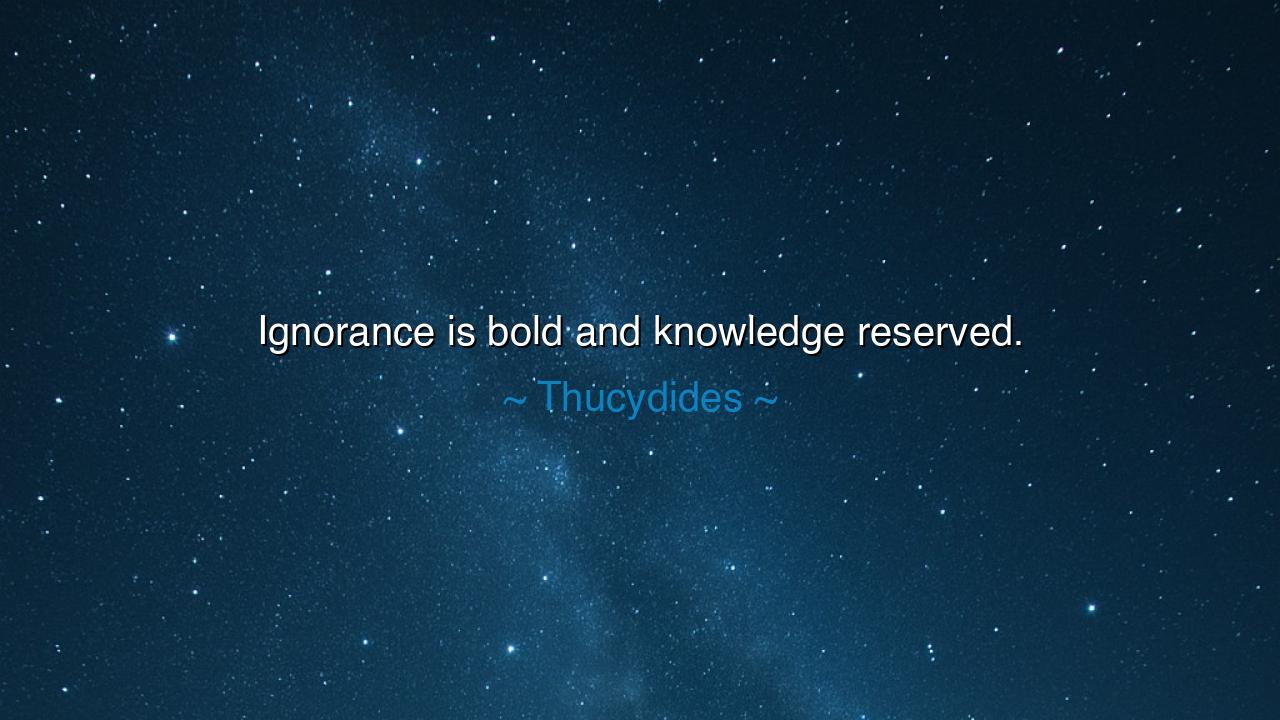
Ignorance is bold and knowledge reserved.






“Ignorance is bold and knowledge reserved.” So wrote Thucydides, the grave historian of Athens, whose eyes saw the madness of war and the folly of men. In this single phrase lies the deep understanding of human nature: that those who know little often speak much, and those who know much often speak little. For ignorance rushes forward without caution, certain in its own rightness, while knowledge, aware of its own limits, moves with humility and care. The words of Thucydides are not only an observation of his age—they are a mirror held up to every age.
In the ancient world, Thucydides chronicled the Peloponnesian War, a time when arrogance and blindness led a mighty people to their downfall. He watched as politicians, swollen with confidence but empty of wisdom, persuaded the masses with grand words and shallow thought. They promised victory; they delivered ruin. Those who knew the cost of war—the seasoned generals, the cautious statesmen—spoke softly, doubting themselves and urging restraint. But their wisdom was drowned by the cries of the bold and the ignorant. Thus Athens, the jewel of Greece, fell not by weakness of arms, but by the boldness of ignorance.
The truth Thucydides revealed is eternal: the wise hesitate because they see the abyss; the foolish leap because they do not. Knowledge is like a torch that shows the dangers as well as the path ahead. The more one learns, the more one perceives how vast and uncertain the world truly is. Therefore, knowledge is reserved—not from fear, but from reverence. The wise man speaks with caution because he understands the weight of his words; the ignorant man speaks with confidence because he does not. Thus, throughout history, we see that great harm is often done not by malice, but by certainty without understanding.
Think of the tale of Socrates, who declared himself the wisest of men because he alone knew that he knew nothing. When asked questions, he did not boast or proclaim; he asked more questions. His reserve was the mark of wisdom, his humility the sign of greatness. His accusers, loud in their convictions and blind in their logic, condemned him for the very virtue that made him wise. They mistook bold ignorance for truth, and quiet wisdom for deceit. In their arrogance, they silenced the one voice that could have guided them toward enlightenment.
In our own time, too, we witness this eternal struggle. The voices of ignorance are often the loudest—those who have not studied, yet claim to know; those who have not seen, yet presume to judge. The truly learned, however, are often silent, for they have looked into the heart of knowledge and found wonder, not pride. They have touched the edge of mystery and understood that wisdom begins where certainty ends. Bold ignorance builds towers of noise; reserved knowledge builds foundations of truth.
Thucydides did not write to scorn mankind, but to warn it. He knew that civilizations fall not because of weakness, but because of arrogance untempered by wisdom. When ignorance wears the crown, chaos reigns. But when knowledge leads with quiet strength, peace and order follow. The wise do not shout to be heard—they act so that truth speaks through their deeds. The ignorant, meanwhile, fill the air with clamor, mistaking sound for substance.
So, my child of thought and reason, learn this lesson well: speak less, learn more. Do not mistake silence for weakness, nor noise for power. Let your words be few, but filled with truth. Listen before you speak; ponder before you act. For in the calm of restraint lies the strength of the truly wise. Ignorance is bold because it sees only itself; knowledge is reserved because it has glimpsed the vastness of all things.
And remember this: the world has always been moved by the loud—but it is saved by the thoughtful. Therefore, walk humbly in your pursuit of wisdom. Let your learning make you gentle, your insight make you kind, and your understanding make you patient. For in that quiet strength lies the mark of a mind that is not ignorant, but immortal.






AAdministratorAdministrator
Welcome, honored guests. Please leave a comment, we will respond soon